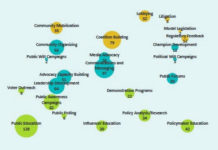Michael O’Loughlin: Exploring Narrative Approaches to Psychological Distress
Professor Michael O'Loughlin of Adelphi University talks about his childhood experiences and how they influenced his narrative and conversational approaches to supporting those suffering with psychological distress.
72 Hour Hold for Inalienable Personhood
Poof! Medical science and brain specialists have just alienated your rights. Far be it from me to question expert judgment, but have any of these people ever considered how dangerous it is to abrogate someone's personhood? It's time to recognize inalienable personhood. Social 'othering' is deadly.
Study Finds Increasing Minimum Wage can Decrease Child Maltreatment
Increasing the minimum wage - even modestly - can lead to less cases of child abuse in the home.
Rise of Involuntary Mental Health: What is Your Resistance Strategy?
Even after working for decades for human rights in mental health, I have been surprised about how involuntary outpatient ideology is taking over. SAMHSA plans to spend as much as $54 million of US taxpayer money for 17 programs across the country to spread this coercive approach.
Challenges in Measuring Low-Value Healthcare
Differences in patient-centric versus service-centric measures make quantifying low-value care difficult.
Dear Mental Health Professionals: Please Stop Defending Yourselves and Listen
Most people who enter the mental health field do so with good intentions. But when it comes to opening up to ideas or information that challenge your worldview or how you conduct your business, on the whole, you’re doing a pretty poor job.
Study Investigates Long-Term Effects of Social and Emotional Learning Programs
Social and Emotional Learning (SEL) programs have gained popularity in U.S. schools in recent years. A new study examines the nature and longevity of their impact on students.
In Memoriam: Matt Stevenson
MIA blogger Matt Stevenson, who was best known to the MIA community for his frequent—and insightful—comments on MIA posts, died last Thursday. He took his own life, at age 32. His last message was this: Don't let a psychiatric diagnosis rob you of your hope.
Review Finds Little Evidence that Electroconvulsive Therapy is Effective for Depression
Researchers examined the dearth of support for Electroconvulsive therapy (ECT) for depressive symptoms in light of studies detailing the associated risks.
Does a Psychiatric Diagnosis Have the Impact of a Medical Curse?
Over and over I've seen the aftermath of that ritual of receiving and internalizing a lifelong, pathologizing diagnosis. I don't think we can underestimate the uncanny power of receiving such proclamations about our personhood by people sanctioned by our culture to serve as arbiters of truth.
Leading Researchers Critique Current Paradigm for Studying ‘Schizophrenia’ Risk
Re-conceptualizing the Clinical-High-Risk/Ultra-High-Risk Paradigm: A critique and reappraisal
Irving Kirsch: The Placebo Effect and What It Tells Us About Antidepressant Efficacy
Dr Irving Kirsch is Associate Director of the Program in Placebo Studies and lecturer in medicine at the Harvard Medical School and Beth Israel Deaconess Medical Center. He joins us this week to discuss his research into the placebo effect and what it tells us about the efficacy of antidepressant drugs.
Thou Shall Not Criticize Our Drugs
A medical journal is expected to promote an open-minded discussion of treatments, even if findings—or criticisms—threaten conventional beliefs. But the American Journal of Psychiatry will not find space for criticism even if it comes from one of the best-known psychiatrists in the world.
Psychiatry Ignores an Elephant in the Room
Large cohort studies of people with a first-episode psychosis provide a unique opportunity for finding out why so many young people with schizophrenia spectrum disorders die at a young age. However, it seems that those psychiatrists who have access to the mortality data generally do not want the facts to come out.
More Follow Up Needed for Drugs Granted Accelerated FDA Approval
Drugs to treat serious or life-threatening conditions can receive accelerated FDA approval, but may expose patients to increased safety risks and reduced efficacy.
Part VI: How Adult Society Betrayed Michelle Carter and Conrad Roy
The story of Michelle Carter and Conrad Roy is not only a tragedy within itself and for all those involved with them, it is emblematic of the situation faced by millions of young people in the western world and increasingly around the entire planet. Final installment in the series.
Replacing Pain with Pain: Hazards of Antidepressant Use for Chronic Pain Relief
The paradox of relieving chronic pain with an antidepressant (and a new set of symptoms).
Health Disparity Project Cuts Out the Recovery Movement
Lots of funders are now doing initiatives to address health disparities. But once again we have found that a project designated to help our community has gone astray without even bothering to ask our community what we need. Here's why that matters and what grassroots advocates can do about it.
The Most Promoted Drugs are Those with Little Therapeutic Value, Study Finds
Majority of top-selling and most promoted drugs in Canada are rated as having very limited safety and efficacy.
The Salvation of Psychiatry
Hope lies in psychotherapy. It is a purely human practice, based on the development of real trust and genuine responsiveness. It is not an analytic process, but a feeling one. We need to return to a psychiatry that respects the complexity of human nature. We need to go beyond ‘do no harm’ and promote genuine healing.
Trauma-Ignored Care? Going to the MAT on Opioids
Our current, reductionistic approach to mental health issues doesn’t offer any insights or explanations on the etiology of most mental disturbances. Similarly, medication assisted treatment (MAT) focuses on the surface symptoms of opiate abuse without addressing the underlying causes of overwhelming distress and pain.
If Psychiatrists Took Truth Serum, What Would They Say?
Psychiatrists don’t use the same language that others do — the meaning of what they say isn’t always so clear. I can translate “psychiatrist speak,” since practicing within the field for over 30 years enabled me to gain easier insight into understanding what their words really mean. Here are 13 examples.
Part V: The Michelle Carter Texting Trial Becomes a Witch Hunt
In Parts I-IV, I discuss how the DA succeeded in gaining the conviction by means of highly emotional and at times misleading and untruthful manipulations in public and in the courtroom. Here I want to look more closely at the DA’s motivation and other activities. Was it a personal vendetta?
Belief in a Favorable Future May Undermine that Future
People who are more likely to believe that others’ views will change to match their own over time are less likely to engage in actions to facilitate that change
The “Shotgun Method” – A Story of Mental Health Crisis in Iceland
"Let's try the shotgun method," my psychiatrist said — meaning that you load the gun with a bunch of pellets and hope that one of them hits the target. I went through 16 different psychiatric medications in five years, and they were not the right choice for me.

































